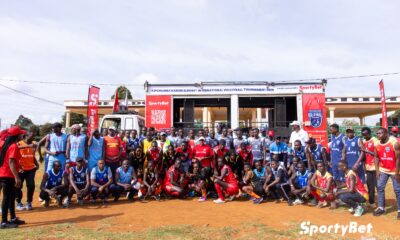NAIROBI, Kenya, Nov 4 – Kenya was among four African climate innovators named on Thursday as winners at the 2021’s prestigious Ashden Awards held at the global climate summit COP26 in Glasgow, Scotland.
Kenyan organization Solar Freeze, providers of sustainable and affordable refrigeration service for food and medicine in refugee camps, won the Ashden Award for Humanitarian Energy.
“To engage communities and take on the climate crisis, we must create new, green jobs – so let’s invest in skills and training,” said Dysmus Kisilu, founder of Solar Freeze.
Two of the African winners are Ugandan and one from the Democratic Republic of Congo.
YICE Uganda, a grassroots initiative training women, young people and refugees, in regenerative farming techniques, won the Ashden Award for Regenerative Agriculture.
“Two of the three major causes of climate change are deforestation and intensive agriculture which emits greenhouse gases – so let’s invest in grassroots initiatives to curb down these practices,” Noah Ssempijja, founder and Programme Director at YICE Uganda said.
New Energy Nexus Uganda, which provides low-cost clean energy loans and business coaching to rural community-based organizations, won the Ashden Award for Energy Access Innovation.
“The climate crisis requires all hands on deck. That’s why we need to invest in a diverse range of entrepreneurs with ideas and innovations that will power the clean energy transition,” Penny Penny Mbabazi Atuhaire, Director of Strategic Partnerships, New Energy Nexus Uganda said.
Advertisement. Scroll to continue reading.
The keynote speech at the awards ceremony was given by Costa Rican President, Carlos Alvarado, who said: “We share the conviction that sustainable development goes hand in hand with economic growth, as well as a deep commitment to de-carbonization and to promote nature-based solutions to the climate crisis and biodiversity loss challenges we face. For that, I do believe the great endeavour of our generation is to abolish fossil fuels.”
“In this pivotal moment for the future of humankind we also need to highlight trailblazing, inspiring efforts to build a better, livable world for current and future generations. That is what the Ashden Awards are about.”
Africa also dominated among the runners up in the awards.
Runners up included KOKO Networks- Kenyan organization which provides ‘ethanol ATMs’ supplying cleaner cooking fuel made from sugar industry waste.
Also in Kenya, the SNV- Kakuma Market Based Energy Access Project supports local clean energy entrepreneurs in Kakuma refugee camp and their local host community, with a focus on cooking and lighting.
Finally, Sendea Academy in Uganda is a collective of locally-owned SMEs driving up standards and providing training in the off-grid renewable sector.
The four African winners and three runners up were chosen from over 800 applicants for their work creating resilience, green economies – including jobs and training – and fairer societies.
“At this year’s Ashden Awards, African climate pioneers really led the way in showcasing bold, brilliant and ground-breaking initiatives – across energy innovation, nature-based solutions and sustainable agriculture. These Ashden Award winners have shown how societies can reduce emissions while also improving people’s lives,” Harriet Lamb, Ashden CEO, said.
Messages from the winners to the COP26 politicians highlighted the urgency of the moment and the solutions that are in place to respond at scale and at speed.
Advertisement. Scroll to continue reading.
“The message to leaders at COP26 is loud and clear,” concluded Harriet Lamb. “If they get behind such practical and proven climate solutions a zero carbon world is within our reach.”
The winners receive grants, publicity and support to grow and replicate their innovation.
The Ashden Awards honour pioneering organisations from the UK and low-income countries lowering carbon emissions and building a fairer world.
Climate solutions charity Ashden has been spotlighting and supporting climate and energy innovators in low-income countries and the UK since 2001.

 Politics1 week ago
Politics1 week ago
 General News1 week ago
General News1 week ago
 General News5 days ago
General News5 days ago
 Sports13 hours ago
Sports13 hours ago





